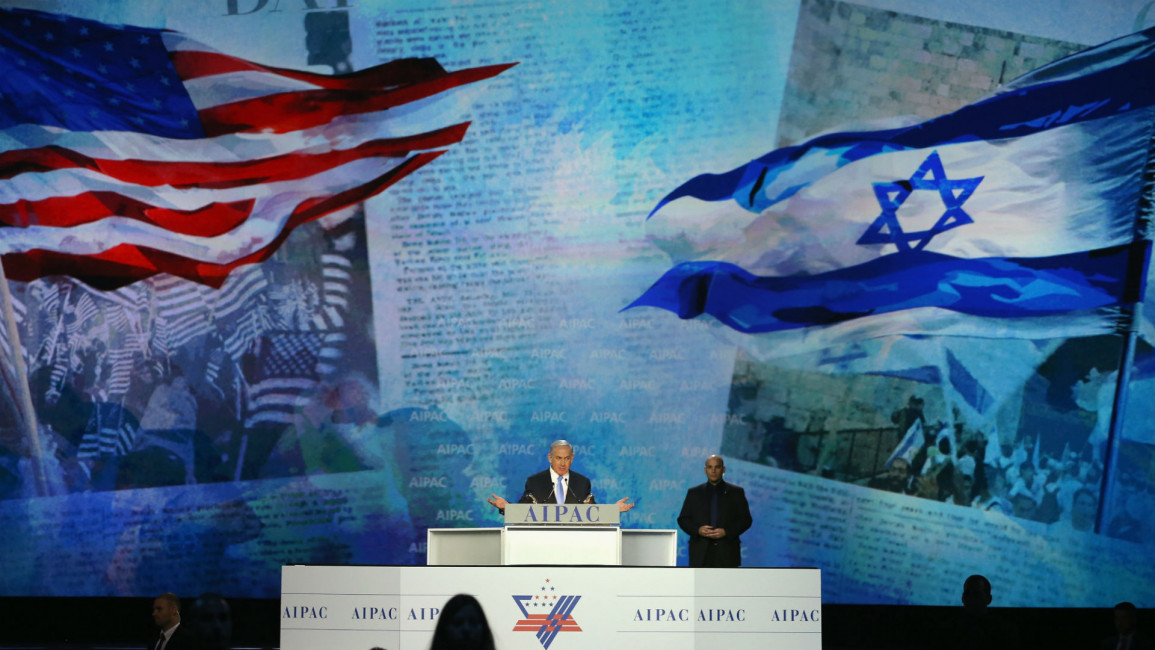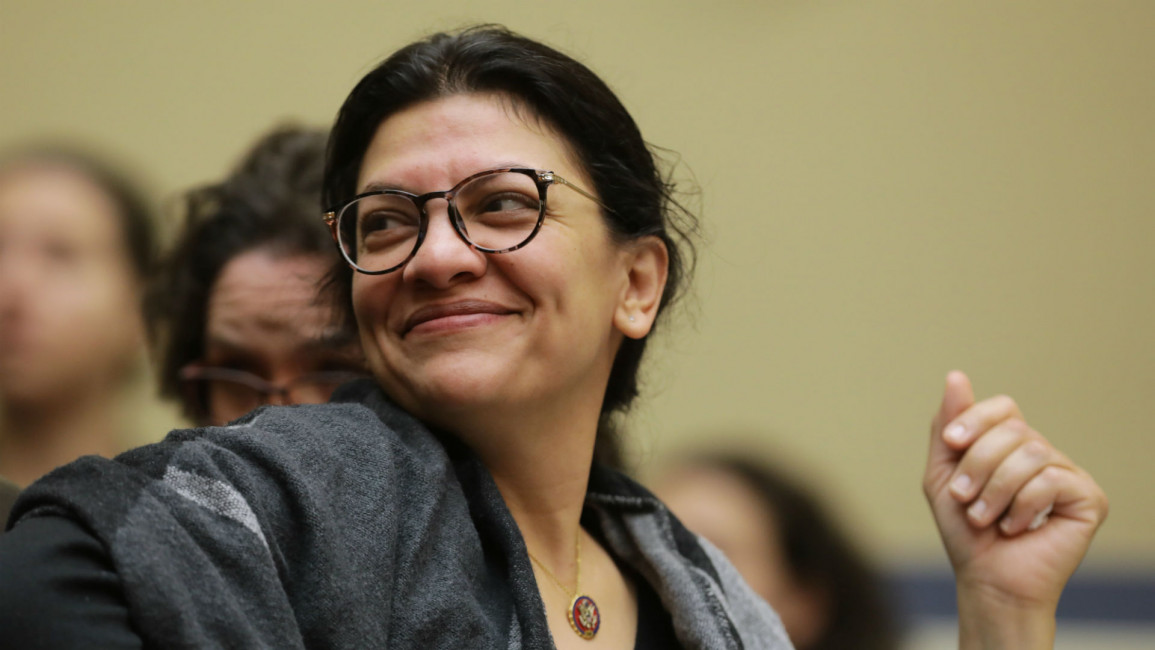
AIPAC's vast campaign to unseat pro-Palestine US lawmakers

As the left wing of the Democratic Party continues to diverge with the party establishment over Israel's war in Gaza, some of the US House's most outspoken critics are already facing primary challengers, with the conflict being used as a pretext.
Among the main targets are progressive Democrats Jamaal Bowman, Cori Bush, Summer Lee, Ilhan Omar and Rashida Tlaib, as well as Republican Thomas Massie for his recent "No" votes on multiple resolutions related to the conflict.
Though this news could be expected as primary season draws closer, the amount of money that will reportedly be spent to help oust these progressive incumbents, estimated at around $100 million for AIPAC and its affiliates, is alarming to progressives whose grassroots campaigns will have a hard time competing financially.
Moreover, targeting relatively young members of Congress, most of them women of colour, could be counterproductive to the Democratic Party, which could lose support from these incumbents' communities.
"An alarming amount of money, estimated at around $100 million for AIPAC and its affiliates, is reportedly being spent to oust progressive incumbents"
"I've warned the party and the Democratic leadership in Congress that they need to rather forcefully address this issue, because the optics of going after these people, if they succeed, the loss will not only be a few progressive members of Congress, but the Democratic Party will face problems moving forward," James Zogby, a veteran pollster and founder of the Arab American Institute, tells The New Arab.
At present, it is not clear what the Democratic leadership's position is on efforts to oust progressive incumbents. What is clear is that AIPAC and its affiliated political action committees, with substantial support from Republican donors, are determined to help oust members of Congress who have expressed dissent against US policy in Israel.
"The idea of the Republican Party raising money from Republican pro-Israel donors to help defeat women of colour, the leadership of the party has to decide: do they really want this to happen? Will they be silent?" Zogby asks.
The importance of progressive incumbents for the Democratic Party
Though progressives in the Democratic Party are often depicted as extreme, their main policy positions tend to poll favourably with American voters. These include universal healthcare, forgiveness of student loan debt (and ultimately affordable education for all), the legalisation of marijuana, higher minimum wage, and over the last three months a ceasefire in Gaza.
"Progressive members are mainstream. AIPAC is extreme. That's why they need money. We're all taking this seriously," Connor Farrell, founder and CEO of Left Rising, tells TNA.
According to a Reuters/Ipsos poll in November, around 68 percent of Americans support a ceasefire, a position that is still only supported by a fraction of members of Congress. Broken down by party, it amounts to around three-quarters of Democrats and half of Republicans who support a ceasefire.
This gap in positions on Gaza has affected voters' support for US President Joe Biden. A poll by Zogby's AAI in late October found a 42 percent drop in Arab American support. Just 17 percent of Arab Americans polled said they would vote for Biden in 2024, down from 59 percent in 2020.
|
|
In addition, Emgage, a Muslim voting advocacy group, found an even starker drop in support, with a survey finding just over 5 percent of Muslim voters saying they would vote for Biden, down from 80 percent in the previous election.
This drop in support for Biden by Arab Americans and Muslims points to the importance of progressives on the ballot, many of whom were instrumental in getting out the youth and immigrant votes. In 2020, more than 80,000 Muslim voters cast their ballots in Michigan, four times as many as in 2016, according to Emgage.
Knowing the increasing importance of Muslims in US elections, Gula says the community is growing into its new role.
"This is new to us," Mohamed Gula, national organising director for Emgage, tells TNA. "The Muslim community is learning how to be civically engaged and where to make investments. We're learning what it means to build a lobby and PACs. We're seeing the Muslim and Arab communities come to fruition."
He says he now sees politicians "talking differently than they were 10 years ago, with candidates and progressive members speaking out boldly. It takes courage".
"Possibly the Congress member that has frustrated AIPAC the most since being elected has been Rashida Tlaib, the first Palestinian Muslim woman to serve in the House"
Different levels of vulnerability based on popularity and district make-up
A look at the different incumbents being targeted shows different levels of vulnerability based on their popularity and district composition.
Jamaal Bowman, who is being challenged by Westchester County Executive George Latimer, achieved a narrow victory in his last primary. His district is diverse, comprising a high proportion of Jewish voters. He is a progressive who at times has irked his leftwing, including a J-Street sponsored trip to Israel. Now, however, he is firmly in the leftwing pro-ceasefire camp.
Cori Bush, who is facing as a primary challenger Wesley Bell, a prosecutor who dropped out of his senate race to run against Bush, appears to have a good chance of keeping her seat, given her popularity and her name recognition. Since before the conflict in Gaza, she has stood by Rashida Tlaib at multiple events in support of Palestinian human rights.
Summer Lee's primary challenger, Bhavini Patel, who is ahead in fundraising, entered the race before the outbreak of war in Gaza. However, since then, she hasn't hesitated to use the conflict to differentiate herself from Lee.
Within days of the start of the war, Patel said Pittsburgh's Jewish community should have someone who is there for them.
"And what we have is somebody who's amplifying terrorist propaganda, stoking hatred, stoking the worst parts of human nature. When we're dealing with a remarkable rise in antisemitism, we deserve better," Patel said, referring to a social media post Lee made following the bombing of Al-Ahli hospital in Gaza, which the Israeli government said likely came from a misfired missile coming from Gaza. Lee later accused Patel of exploiting the lives of Palestinians and Israelis for political gain.
Ilhan Omar could be among the more vulnerable of the progressive incumbents, given that she unexpectedly only narrowly won her last primary. Like last time, her main opponent is Don Samuels, who again is being supported by an AIPAC-affiliated PAC. Samuels generated controversy last month when he made comments about Omar's appearance while criticising her lack of town halls.
"You’re not cute enough, you don’t dress well enough, nothing about you is attractive enough to overcome that deficit," Samuels said on a podcast in late November. Unsurprisingly, Omar responded by saying that such a comment was beneath the dignity of someone running for public office, an episode that might have inadvertently boosted her popularity.
|
|
Possibly the Congress member that has frustrated AIPAC the most since being elected has been Rashida Tlaib, the first Palestinian Muslim woman to serve in the House.
During the last primary cycle, a new PAC was formed with the backing of a major AIPAC donor. The Urban Empowerment Action PAC, whose stated purpose was to narrow the wealth gap between Black and white Americans, supported a Black candidate against Tlaib. As the election drew near, they appeared to have given up.
This cycle, AIPAC appears to be getting bolder in its efforts to try to help oust Tlaib. In two instances so far, Democrats running for US Senate in Michigan have said that AIPAC offered them $20 million to drop their senate bids to run against Tlaib in the House. At this point, it will be difficult for AIPAC to subtly support a well-funded candidate against Tlaib without raising questions.
"There doesn't seem to be a bridge that's too far for them. Their threshold for dissent is zero"
Concerns over AIPAC and the future of the Democratic Party
Though for many people, the tactics by AIPAC and its affiliates to oust progressives might appear farcical, for the candidates themselves and for those concerned with campaign finance reform and democracy, it is no laughing matter.
Following the 6 January insurrection, AIPAC endorsed more than 100 candidates who denied the 2020 general election results, a sign to many that they cared more about supporting Israel's right-wing government than democracy in the US.
There have also been questions over its choice of targets, which last cycle included a successful strategy against Michigan's Andy Levin, a Jewish congressman long considered pro-Israel, but who has supported conditions for aid to Israel (around election time, he made the media rounds exposing the names of major AIPAC donors); and Donna Edwards of Maryland, who has not been outspoken on Israel, but who has voted "present" on at least one bill related to Israel.
"There doesn't seem to be a bridge that's too far for them. Their threshold for dissent is zero," says Farrell.
Referring to the Democratic leadership's lack of pushback against AIPAC's campaign against progressives, Zogby says, "They're creating a rift that will last a long time."
Brooke Anderson is The New Arab's correspondent in Washington DC, covering US and international politics, business, and culture.
Follow her on Twitter: @Brookethenews




